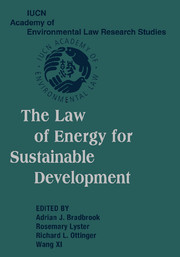Book contents
- Frontmatter
- Contents
- Acknowledgments
- Message from Kofi A. Annan, Secretary-General, United Nations
- Introduction – A Global Learned Society to Address Earth's Evolution: The IUCN Academy of Environmental Law
- Public Lectures on International Environmental Law
- PART ONE SUSTAINABLE DEVELOPMENT AND THE ROLE OF ENERGY LAW
- PART TWO LEGAL ISSUES IN CONTEMPORARY ENERGY LAW
- PART THREE INTERNATIONAL ENERGY LAW
- 11 International Law and Global Sustainable Energy Production and Consumption
- 12 Policy Options
- 13 Financing Energy for Sustainable Development
- 14 The Clean Development Mechanism and UNFCCC / Kyoto Protocol Developments
- 15 The Report of the World Commission on Dams: Some Implications for Energy Law
- 16 International Issues for Sustainable Development: IUCN Perspective
- 17 Enhanced Implementation and Enforcement of International Environmental Laws by the Judiciary
- PART FOUR COMPARATIVE ENERGY LAW
- PART FIVE ELECTRICITY RESTRUCTURING
- PART SIX FINANCING FOR SUSTAINABLE ENERGY
- PART SEVEN CIVIL SOCIETY AND THE PROCEDURAL REQUIREMENTS OF ENERGY LAW FOR SUSTAINABLE DEVELOPMENT
- Index
17 - Enhanced Implementation and Enforcement of International Environmental Laws by the Judiciary
Published online by Cambridge University Press: 10 August 2009
- Frontmatter
- Contents
- Acknowledgments
- Message from Kofi A. Annan, Secretary-General, United Nations
- Introduction – A Global Learned Society to Address Earth's Evolution: The IUCN Academy of Environmental Law
- Public Lectures on International Environmental Law
- PART ONE SUSTAINABLE DEVELOPMENT AND THE ROLE OF ENERGY LAW
- PART TWO LEGAL ISSUES IN CONTEMPORARY ENERGY LAW
- PART THREE INTERNATIONAL ENERGY LAW
- 11 International Law and Global Sustainable Energy Production and Consumption
- 12 Policy Options
- 13 Financing Energy for Sustainable Development
- 14 The Clean Development Mechanism and UNFCCC / Kyoto Protocol Developments
- 15 The Report of the World Commission on Dams: Some Implications for Energy Law
- 16 International Issues for Sustainable Development: IUCN Perspective
- 17 Enhanced Implementation and Enforcement of International Environmental Laws by the Judiciary
- PART FOUR COMPARATIVE ENERGY LAW
- PART FIVE ELECTRICITY RESTRUCTURING
- PART SIX FINANCING FOR SUSTAINABLE ENERGY
- PART SEVEN CIVIL SOCIETY AND THE PROCEDURAL REQUIREMENTS OF ENERGY LAW FOR SUSTAINABLE DEVELOPMENT
- Index
Summary
INTRODUCTION
At present, an environmental crisis looms large, for which two major interrelated causes can be identified: continuing environmental degradation and a lack of respect for the law, together with a changed approach to ethical and moral values. Recent monitoring and data collection systems evidence increasing, and somewhat frightening, threats and damage to the environment. These are sometimes of a transboundary/transnational nature and have deleterious global and national effects.
INTERNATIONAL EFFORTS TO FORMULATE AND IMPLEMENT SUSTAINABLE DEVELOPMENT POLICIES
Although endeavors, on national and international levels, to prevent environmental risks and infringements have intensified since the Rio Conference, the goals of environmental protection have not yet been adequately achieved. This has been confirmed in the UN Millennium Development Declaration of September 2000 (Millennium Declaration) and again by the Johannesburg Declaration on Sustainable Development in September 2002 (Johannesburg Declaration). In particular, paragraph 13 of the Johannesburg Declaration provides: “The global environment continues to suffer. Loss of biodiversity continues, fish stocks continue to be depleted, desertification claims more and more fertile land, the adverse effects of climate change are already evident, natural disasters are more frequent and more devastating and developing countries more vulnerable, and air, water and marine pollution continue to rob millions of a decent life.”
As a blueprint for change, the Millennium Declaration stressed the urgent need to implement and respect principles of equity and social justice; of tolerance; and the eradication of poverty.
- Type
- Chapter
- Information
- The Law of Energy for Sustainable Development , pp. 260 - 288Publisher: Cambridge University PressPrint publication year: 2005



